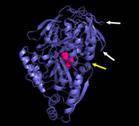2018/19 Applications Now Open*
Applications are now open for 2018/19 admission to the MRes Modelling Biological Complexity. The deadline for applications from self-funding candidates for this MRes programme is 4 July 2018. Unfortunately, there are no funded places on offer for 2018/19.
 |  |  |
The MRes consists of four main elements:
Foundation Courses (unweighted)
The foundation courses are essential for background knowledge, but also for students to gain an overview of the range of science covered in CoMPLEX to help choose their Mini-Projects and Summer Project.
Students from a mathematical or physical sciences background are encouraged to take undergraduate courses in basic modern biology covering genetics, molecular biology, cell biology, physiology and ecology. Students from the life sciences may take courses in mathematics based on individual need. All students take the following courses developed specifically for the programme:
- ABMB: Advanced Biological Modelling and Bioinformatics
- ITPL: Introduction to Physical Techniques in the Life Sciences
- ABC Course: Analysis of Biological Complexity
- Statistics
- Programming Tools
- Matlab
Students are not required to sit written examinations in these foundation courses.
Mini-Projects (weighted 40%)
These are three assessed essays on cross-disciplinary work within the CoMPLEX remit. Projects are set by two scientists: one from life sciences and the other from the mathematical/physical sciences.
The basis of Mini-Projects is usually a pair of lectures, one given by a life scientist and one by a mathematical/physical scientist.
In each presentation the life scientist first sets out the biological/medical background to a particular research challenge, and discusses the specific focus for collaborative work. The mathematical/physical scientist then explains how mathematical, computational or physical techniques can be applied to gain insight into the biological issues. Students have a choice of Mini-Projects to pursue and if they choose a particular project then tutorial discussions with the presenters help students to consolidate their understanding.
Each Mini-Project typically takes 6 weeks to complete; these projects form a major part of the assessment. Usually the first of these is based on a topic selected from the foundation courses and the remaining two are based on topics chosen from a series of set presentations.
Mini-Projects are essentially extended essays, where students should demonstrate that they have understood both the life sciences issue and the mathematical/physical science techniques used to address it. In addition, students should provide some original input into the topic, whether by way of suggested future research directions, new applications of existing techniques, or even novel analysis. During the Mini-Projects element of the programme, it may be possible to undertake a short practical project to replace one of the essays.
Summer Project (weighted 40%)
Students will undertake a summer research project which will run from late May/early June onwards for around 11 weeks. The project may be theoretical or practical and will involve original research. A list of potential topics and supervisors will be circulated to students, but they are free to suggest a topic of the students' own choosing, provided that suitable supervisors can be identified.
Summer Projects must demonstrate evidence of substantial original interdisciplinary thinking. The project may be theoretical or practical and will involve original research. Work that merely describes a biological model, or develops a technique from the mathematical, computational or physical sciences but draws no biological conclusions is not sufficient.
Transferable Skills (weighted 20%)
This is provided through selected tasks and fixed components organised by CoMPLEX.
There are eight equally weighted marked assessments, which together make up the transferable skills module mark. This includes compulsary attendance at the Seminar Series and CoMPLEX events.
The assessments are: statistics in biology, computer programming assessed task, web design, poster and oral presentations, database handling skills, writing research proposals, refereeing papers and reflective essay.
Applicants must have or expect a good upper class 2nd or 1st class degree in any area of the mathematical, physical, computer, engineering or life sciences (or equivalent EU/overseas degree). For students from the life sciences, some mathematics experience is necessary (e.g. A Levels or higher).
Applicants should use their personal statement to demonstrate their interest in, and suitability for, the programme.
Information on 2018/19 entry to the MRes Modelling Biological Complexity can be found on the UCL website.
A complete application includes:
- Personal statement.
- Academic transcripts.
- Two academic references. Please note, we cannot accept references from postdoctoral researchers.
2018/19 Fees
- UK/EU Full-time: £5,060
- Overseas Full-time: ££24,420
Programme starts
September 2018
Application dates
- Open: 16 October 2017
- Close: 27 July 2018
Funding Opportunities
Applications are currently open to self-funding applicants and ORS/GRS applications.
Please consult the UCL Scholarships and Funding website for details of other funding opportunities available.
 Close
Close

